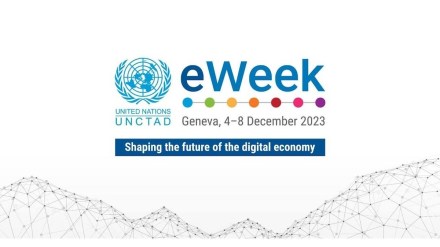The UN Conference on Trade and Development (UNCTAD) is set to usher in a new era in its exploration of the digital landscape with the debut of its eWeek from December 4 to 8, 2023. Departing from the established eCommerce Week series initiated in 2016, this transformation aims to address the evolving challenges posed by digitalization.
Themed “Shaping the future of the digital economy,” the UNCTAD eWeek will host more than 150 sessions delving into critical aspects of digitalization.
Among the pivotal topics on the agenda are platform governance, the developmental impact of artificial intelligence (AI), eco-friendly digital practices, empowering women through digital entrepreneurship, and accelerating digital readiness in developing nations.
UNCTAD Secretary-General Rebeca Grynspan emphasized, “The digital economy plays a critical role in advancing development goals at all levels. Through inclusive and multi-stakeholder discussions, we can together build a global digital future that works for all.”
The week-long event aims to bring together diverse participants, including governments, CEOs, heads of international organizations, civil society representatives, and various stakeholders. Renowned figures such as Amandeep Singh Gill, the UN Secretary-General’s Envoy on Technology, and Deemah AlYahya, secretary-general of the Digital Cooperation Organization, are slated to be high-level speakers.
The event, based in Geneva, will also feature a virtual conference center to facilitate online participation. This adaptation to the digital format aligns with the overarching theme of navigating the fast-paced digital landscape.
In the face of the rapid integration of artificial intelligence into the digital economy, eWeek recognizes the urgency of understanding both the opportunities and risks these technologies present, especially for developing nations. The scheduled high-level sessions on December 6 will scrutinize the safety of AI and explore how global governance efforts can keep pace with its advancement to ensure equity and accountability in the digital economy. These discussions will contribute to the broader efforts led by the newly established UN AI Advisory Body.
The issue of data concentration and unequal distribution of benefits in the digital economy also takes center stage. With over 70% of global digital advertising revenue monopolized by just five platforms, the UNCTAD eWeek aims to examine competition law and regulation for digital markets. This initiative seeks to identify policy options that can help developing countries unlock their innovation potential while striving for a more equitable digital landscape.
Recognizing the vast potential of the data-driven digital economy to spur economic growth and innovation, the UNCTAD eWeek underscores the necessity for global efforts to bridge existing divides in digital readiness. Developing countries lacking the required infrastructure and capabilities risk further marginalization in the digital era. Additionally, the environmental impact of emerging technologies, such as large, energy-consuming language models for AI, is acknowledged as a concern, prompting exploration into ways to balance digital growth with environmental sustainability.
As a platform for constructive and inclusive dialogue, the UNCTAD eWeek aims to generate insights and actions that can contribute to global initiatives. The event is organized with the support of the Swiss government and other donors, aligning with the UNCTAD-led eTrade for all initiative.
Culminating in a joint declaration, eWeek seeks to foster stronger partnerships vital for navigating the complexities of digitalization in the current geopolitical, economic, and climate crises. The focus remains on building a safe, trusted, and inclusive digital economy that aligns with the pursuit of Sustainable Development Goals.
Through the eTrade for all initiative, UNCTAD will facilitate leadership round-table discussions on unlocking digital trade and inclusive development, emphasizing the role of partnerships in shaping a more inclusive and sustainable digital future.
